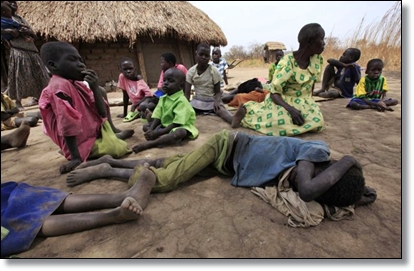Nodding Disease: What is Uganda Doing?

 |
| Victims of nodding disease Photo courtesy |
Why did those who ferried the nodding disease patients from Kitgum subject them to a six hour drive for a distance of approximately 440 kilometres to Mulago? According to the Uganda Bureau of Statistics (UBOS) as of 2009 there are 42 health facilities in the wider Kitgum area, of which one is a government hospital and 32 are government owned health centres. Why did those who ferried the patients decide that none of the hospitals in the wider Kitgum area were sufficient to handle the nodding disease? If they are right and the Kitgum hospitals are insufficient in capacity, why is that the case?
Using Kitgum’s life expectancy rate, which according to UBOS is only 29 years as a proxy indicator for the capacity of Kitgum’s hospitals to provide health care, an assessment that the Kitgum hospitals are insufficient is plausible. I wonder, is Kitgum’s low life expectancy and the seeming stunted growth of its children, such as Opio’s, only a reflection of Kitgum’s poor access to healthcare or a symptom of our failure as a nation to ensure that our people stay healthy and alive? Judging from Opio’s size at 15 years old, his access to food during his formative years was insufficient.
Opio’s condition is an indicator that Uganda is malfunctioning. The over indulgent perception that the members of Uganda’s 9th parliament have of themselves and their self-prescribed ‘know-it-all’ role as the legislator, the investigator, the auditor, the prosecutor, the judge, the oil expert and the power generation expert perhaps is a major root cause of Uganda’s malfunctioning. What really is the role of Uganda’s 375 MPs, if at the end of the day the majority of Ugandans, such as Opio, continue to suffer an undignified way of life? To whom are the Uganda MPs answerable to? How well do Uganda’s MPs measure up to the ideals that Mwalimu Julius Nyerere held for leaders to be always responsible to the people and that leaders must always consist of representatives – spokesmen and servants of the people?
Are Uganda’s MPs servants of the people when they allow situations such as in Kitgum to prevail in the Country? Are Uganda’s MPs serving the people, when in the midst of the nodding disease crisis they saw it fit to divert a whopping Uganda shillings (Ush) 103,000,000 (approximately USD 43,181) to give to each one of them to buy luxury motor vehicles which they can use to move from their luxurious homes in Kampala to the Parliament buildings, regularly causing huge traffic jams at Parliament Avenue and damaging pavements on which they park for there currently isn’t sufficient parking space at Parliament for the MPs to park their huge four wheel drive cars?
The decision of the MPs to award themselves our Country’s resources at the expense of the suffering millions of Ugandans is not technically wrong; however, there is everything morally wrong with such a decision. In fact, one wonders at the very essence of the dominant discourse and the style of Uganda’s 9th parliament, particularly, as exemplified by their chest thumping shenanigans during their ‘media-sound-bite-seeking’ sessions on the floor of the house in the recent past as they ‘handled’ debates, such as on Uganda’s oil. The amount of Uganda’s resources that are wasted on dubious ‘emergencies’ created by MPs such as, after being outsmarted by President Museveni, their legal appeal to the European Union courts to find European oil firms guilty is mind boggling. Are our MPs for real?
One wonders if Uganda’s MPs are no different from the representatives of the Organisation for Economic Development and Cooperation (OECD), whom the celebrated literary scholar, Chinua Achebe describes in his autobiographical essay titled “Africa is People” contained in his book “The Education of a British-Protected Child.” In his essay, Achebe describes a meeting with the OECD in which he realised that what was going on before him was a “fiction workshop” and similar to the abstract ‘technical’ discussions in which our MPs engage. Achebe writes that he felt compelled to remind that OECD meeting that Africa is people, real people. Perhaps, if nothing else, nodding disease in Uganda is a reminder to Uganda’s MPs to reconnect with Uganda’s realities, to remember that Uganda is people, first and foremost. Ugandans need our MPs to see us as the primary resource of our Country and they need to give more attention to us, the people, than they have tended to give to our Countries other resources.
Uganda’s MPs and leaders at all levels need to heed James O’tool’s leadership advice in his book The Executive Compass that in the final analysis, leadership issues require moral judgment on the part of decision makers and that decisions made solely on technical knowledge require no leadership. The nodding disease, malnutrition and teachers' low salaries morally take precedence over the luxurious cars for MPs.
By Norah Owaraga (BA, MSc.)
C. E. O., Executive Support Services.
